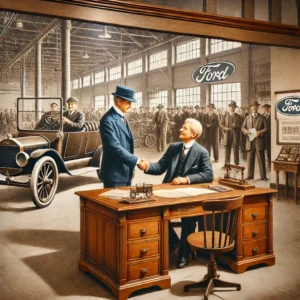 On July 15, 1903, the Ford Motor Company sold its first car, a Model A, to Dr. Ernst Pfenning of Chicago, marking a significant milestone in automotive history. This initial sale signified the beginning of Ford’s journey toward becoming one of the world’s foremost automobile manufacturers. The Model A, a simple yet reliable vehicle, showcased Henry Ford’s vision of creating practical and affordable transportation for the masses. This sale not only provided the fledgling company with a much-needed financial boost but also demonstrated the public’s growing interest in automobiles, setting the stage for Ford’s future success.
On July 15, 1903, the Ford Motor Company sold its first car, a Model A, to Dr. Ernst Pfenning of Chicago, marking a significant milestone in automotive history. This initial sale signified the beginning of Ford’s journey toward becoming one of the world’s foremost automobile manufacturers. The Model A, a simple yet reliable vehicle, showcased Henry Ford’s vision of creating practical and affordable transportation for the masses. This sale not only provided the fledgling company with a much-needed financial boost but also demonstrated the public’s growing interest in automobiles, setting the stage for Ford’s future success.
Ford’s innovative approach to production, particularly the development of the moving assembly line, would revolutionize industrial manufacturing. Introduced in 1913, this method drastically reduced the time and cost of producing cars, making them more affordable and accessible to the general public. The assembly line allowed Ford to achieve unprecedented levels of efficiency, producing cars at a rate that far surpassed traditional manufacturing techniques. This innovation not only transformed the automotive industry but also had a profound impact on various other sectors, leading to widespread adoption of assembly line production methods across different industries.
The success of the Ford Motor Company and its Model A had far-reaching implications for global transportation and the 20th-century economy. By making cars affordable, Ford democratized personal transportation, enabling more people to travel farther and faster than ever before. This shift facilitated the growth of suburbs, the expansion of road networks, and the development of new business models centered around automobile travel. Additionally, Ford’s emphasis on fair wages and efficient production contributed to the rise of the American middle class and set new standards for labor practices. The sale of that first Model A to Dr. Pfenning was not just the beginning of Ford’s corporate success, but a pivotal moment that would reshape the modern world.
